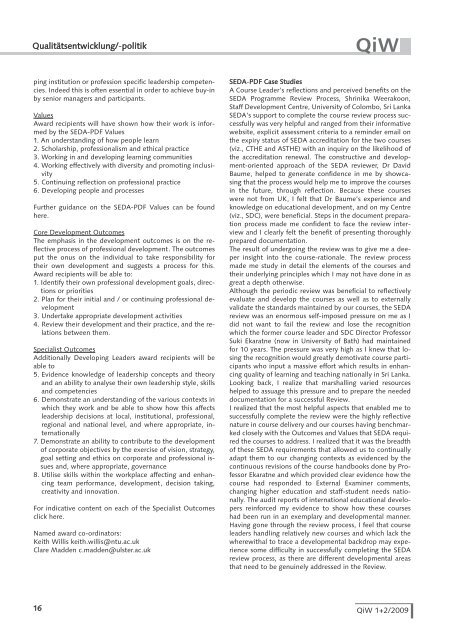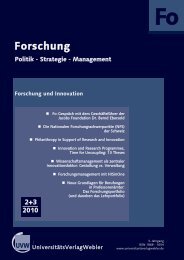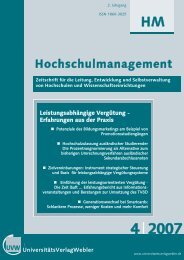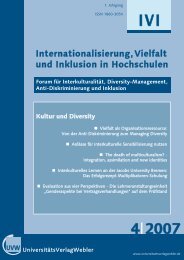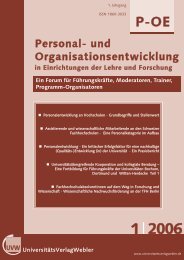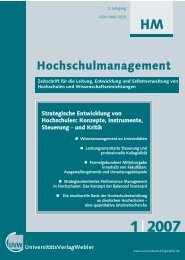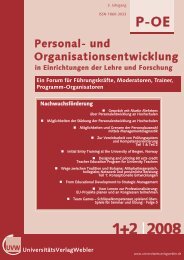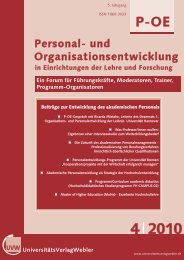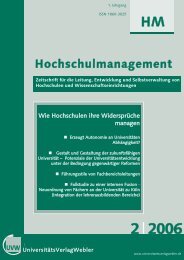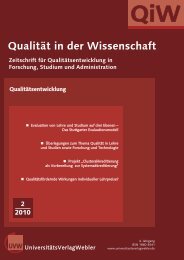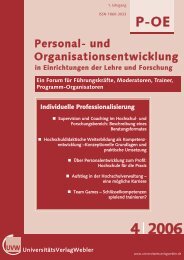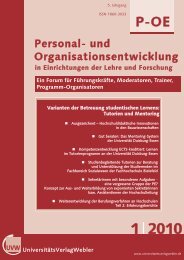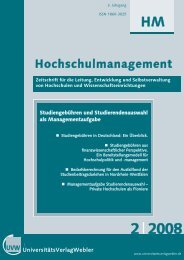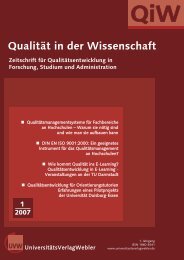QiW - UniversitätsVerlagWebler
QiW - UniversitätsVerlagWebler
QiW - UniversitätsVerlagWebler
Sie wollen auch ein ePaper? Erhöhen Sie die Reichweite Ihrer Titel.
YUMPU macht aus Druck-PDFs automatisch weboptimierte ePaper, die Google liebt.
Qualitätsentwicklung/-politik<br />
<strong>QiW</strong><br />
ping institution or profession specific leadership competencies.<br />
Indeed this is often essential in order to achieve buy-in<br />
by senior managers and participants.<br />
Values<br />
Award recipients will have shown how their work is informed<br />
by the SEDA-PDF Values<br />
1. An understanding of how people learn<br />
2. Scholarship, professionalism and ethical practice<br />
3. Working in and developing learning communities<br />
4. Working effectively with diversity and promoting inclusivity<br />
5. Continuing reflection on professional practice<br />
6. Developing people and processes<br />
Further guidance on the SEDA-PDF Values can be found<br />
here.<br />
Core Development Outcomes<br />
The emphasis in the development outcomes is on the reflective<br />
process of professional development. The outcomes<br />
put the onus on the individual to take responsibility for<br />
their own development and suggests a process for this.<br />
Award recipients will be able to:<br />
1. Identify their own professional development goals, directions<br />
or priorities<br />
2. Plan for their initial and / or continuing professional development<br />
3. Undertake appropriate development activities<br />
4. Review their development and their practice, and the relations<br />
between them.<br />
Specialist Outcomes<br />
Additionally Developing Leaders award recipients will be<br />
able to<br />
5. Evidence knowledge of leadership concepts and theory<br />
and an ability to analyse their own leadership style, skills<br />
and competencies<br />
6. Demonstrate an understanding of the various contexts in<br />
which they work and be able to show how this affects<br />
leadership decisions at local, institutional, professional,<br />
regional and national level, and where appropriate, internationally<br />
7. Demonstrate an ability to contribute to the development<br />
of corporate objectives by the exercise of vision, strategy,<br />
goal setting and ethics on corporate and professional issues<br />
and, where appropriate, governance<br />
8. Utilise skills within the workplace affecting and enhancing<br />
team performance, development, decision taking,<br />
creativity and innovation.<br />
For indicative content on each of the Specialist Outcomes<br />
click here.<br />
Named award co-ordinators:<br />
Keith Willis keith.willis@ntu.ac.uk<br />
Clare Madden c.madden@ulster.ac.uk<br />
SEDA-PDF Case Studies<br />
A Course Leader’s reflections and perceived benefits on the<br />
SEDA Programme Review Process, Shrinika Weerakoon,<br />
Staff Development Centre, University of Colombo, Sri Lanka<br />
SEDA’s support to complete the course review process successfully<br />
was very helpful and ranged from their informative<br />
website, explicit assessment criteria to a reminder email on<br />
the expiry status of SEDA accreditation for the two courses<br />
(viz., CTHE and ASTHE) with an inquiry on the likelihood of<br />
the accreditation renewal. The constructive and development-oriented<br />
approach of the SEDA reviewer, Dr David<br />
Baume, helped to generate confidence in me by showcasing<br />
that the process would help me to improve the courses<br />
in the future, through reflection. Because these courses<br />
were not from UK, I felt that Dr Baume’s experience and<br />
knowledge on educational development, and on my Centre<br />
(viz., SDC), were beneficial. Steps in the document preparation<br />
process made me confident to face the review interview<br />
and I clearly felt the benefit of presenting thoroughly<br />
prepared documentation.<br />
The result of undergoing the review was to give me a deeper<br />
insight into the course-rationale. The review process<br />
made me study in detail the elements of the courses and<br />
their underlying principles which I may not have done in as<br />
great a depth otherwise.<br />
Although the periodic review was beneficial to reflectively<br />
evaluate and develop the courses as well as to externally<br />
validate the standards maintained by our courses, the SEDA<br />
review was an enormous self-imposed pressure on me as I<br />
did not want to fail the review and lose the recognition<br />
which the former course leader and SDC Director Professor<br />
Suki Ekaratne (now in University of Bath) had maintained<br />
for 10 years. The pressure was very high as I knew that losing<br />
the recognition would greatly demotivate course participants<br />
who input a massive effort which results in enhancing<br />
quality of learning and teaching nationally in Sri Lanka.<br />
Looking back, I realize that marshalling varied resources<br />
helped to assuage this pressure and to prepare the needed<br />
documentation for a successful Review.<br />
I realized that the most helpful aspects that enabled me to<br />
successfully complete the review were the highly reflective<br />
nature in course delivery and our courses having benchmarked<br />
closely with the Outcomes and Values that SEDA required<br />
the courses to address. I realized that it was the breadth<br />
of these SEDA requirements that allowed us to continually<br />
adapt them to our changing contexts as evidenced by the<br />
continuous revisions of the course handbooks done by Professor<br />
Ekaratne and which provided clear evidence how the<br />
course had responded to External Examiner comments,<br />
changing higher education and staff-student needs nationally.<br />
The audit reports of international educational developers<br />
reinforced my evidence to show how these courses<br />
had been run in an exemplary and developmental manner.<br />
Having gone through the review process, I feel that course<br />
leaders handling relatively new courses and which lack the<br />
wherewithal to trace a developmental backdrop may experience<br />
some difficulty in successfully completing the SEDA<br />
review process, as there are different developmental areas<br />
that need to be genuinely addressed in the Review.<br />
16<br />
<strong>QiW</strong> 1+2/2009


